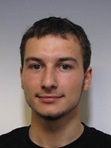 Large-scale methane measurements on individual ruminants for genetic evaluations
Large-scale methane measurements on individual ruminants for genetic evaluations
Marcin Pszczola

Tell us about yourself (Who are you? Where are you from? What is your educational background?)
I was born in Poland, where I have finished a BSc study in Animal Husbandry at Poznań University of Life Sciences. In 2007, I started with my MSc study in in Animal Sciences at Wageningen University with specialization ‘Animal Breeding and Genetics’. During my MSc, I worked with Ignacy Misztal at University of Georgia USA on heat stress affecting fertility of U.S. Holstein cattle and on genomic selection with Mario Calus at Wageningen UR Livestock Research. This work initiated further research realized within my PhD. This was a collaborative project between Poznan University of Life Sciences and Wageningen UR Livestock Research. During my PhD, I worked on optimizing genomic selection for novel traits. After my defense in 2013, I have been hired as Assistant Professor at Department of Genetics and Animal Breeding at Poznan University of Life Sciences, where I work on optimizing genomic selection for novel traits and on genetics of methane emission from dairy cattle.
What is your area of expertise?
Genomic selection, optimizing reference population, genetics of methane emission from ruminants, dairy cattle
Where does your focus lie within your current project(s)? (related to methane)
I focus on quantifying heritable variation in methane emission from dairy cows measured trough sniffer method in production environment.
What would be the added value for you of joining an international researchers network? (such as the METHAGENE network, or the RuminOmics project)
Joining an international project gives a broader perspective, especially, when the topic is as complex as methane emission, where physiologists, nutritionists and geneticists have to learn from each other to get a bigger picture of the analysed trait.
What and/or who inspired you to make a career in science?
My dad.
What do you enjoy most about your work?
Developing new knowledge and tools that might be implemented into animal breeding improving the currently used methods.
What is your most stand-out or surprising moment in science so far?
Holding my PhD thesis printed out and seeing an uptake of ideas presented in it.


